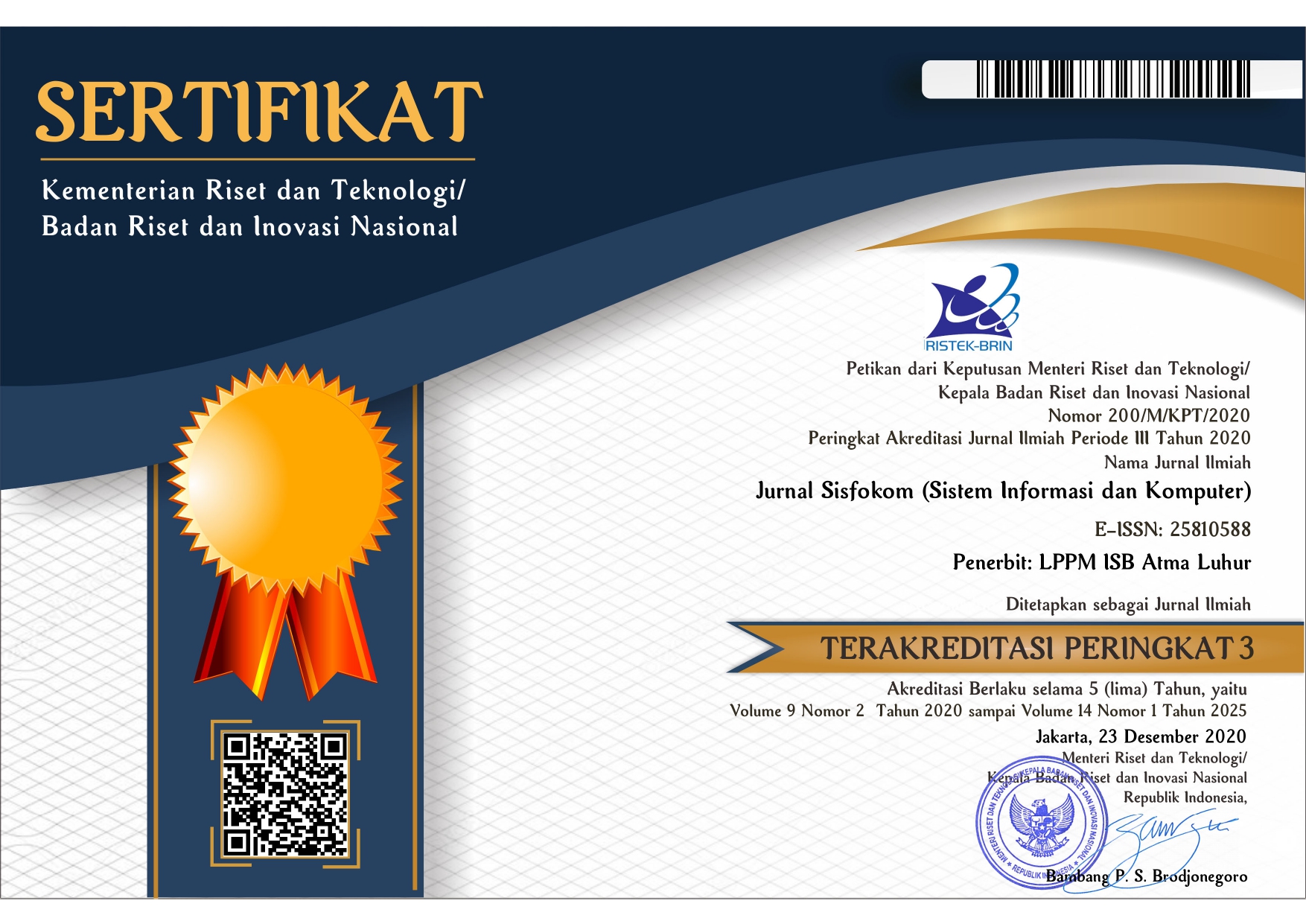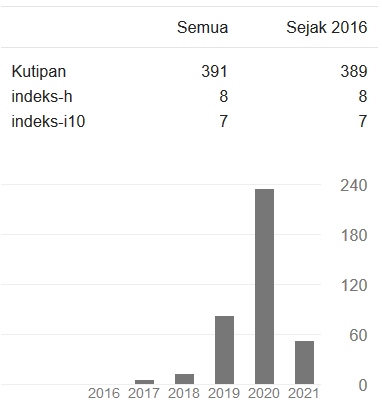Perbandingan Fluid Genetic Algorithm dan Genetic Algorithm untuk Penjadwalan Perkuliahan
(1) STMIK Global Informatika MDP
(2) STMIK Global Informatika MDP
(*) Corresponding Author
Abstract
Keywords
Full Text:
PDFReferences
E. Ghasemi, P. Moradi, and M. Fathi, “Integrating ABC with genetic grouping for university course timetabling problem,” in 2015 5th International Conference on Computer and Knowledge Engineering (ICCKE), 2015, pp. 24–29, doi: 10.1109/ICCKE.2015.7365857.
E. A. Abdelhalim and G. A. [El Khayat], “A Utilization-based Genetic Algorithm for Solving the University Timetabling Problem (UGA),” Alexandria Eng. J., vol. 55, no. 2, pp. 1395–1409, 2016, doi: https://doi.org/10.1016/j.aej.2016.02.017.
R. Lewis and J. Thompson, “Analysing the effects of solution space connectivity with an effective metaheuristic for the course timetabling problem,” Eur. J. Oper. Res., vol. 240, no. 3, pp. 637–648, 2015, doi: https://doi.org/10.1016/j.ejor.2014.07.041.
A. A. Mahiba and C. A. D. Durai, “Genetic Algorithm with Search Bank Strategies for University Course Timetabling Problem,” Procedia Eng., vol. 38, pp. 253–263, 2012, doi: https://doi.org/10.1016/j.proeng.2012.06.033.
Y. Lei, J. Shi, and Z. Yan, “A memetic algorithm based on MOEA/D for the examination timetabling problem,” Soft Comput., vol. 22, no. 5, pp. 1511–1523, 2018, doi: 10.1007/s00500-017-2886-y.
L. L. [de Oliveira], A. A. Freitas, and R. Tinós, “Multi-objective genetic algorithms in the study of the genetic code’s adaptability,” Inf. Sci. (Ny)., vol. 425, pp. 48–61, 2018, doi: https://doi.org/10.1016/j.ins.2017.10.022.
C. Akkan and A. Gülcü, “A bi-criteria hybrid Genetic Algorithm with robustness objective for the course timetabling problem,” Comput. Oper. Res., vol. 90, pp. 22–32, 2018, doi: https://doi.org/10.1016/j.cor.2017.09.007.
Y. Fang, X. Xiao, and J. Ge, “Cloud computing task scheduling algorithm based on improved genetic algorithm,” Proc. 2019 IEEE 3rd Inf. Technol. Networking, Electron. Autom. Control Conf. ITNEC 2019, no. Itnec, pp. 852–856, 2019, doi: 10.1109/ITNEC.2019.8728996.
P. Naithani, “Genetic algorithm based scheduling to reduce energy consumption in cloud,” PDGC 2018 - 2018 5th Int. Conf. Parallel, Distrib. Grid Comput., pp. 616–620, 2018, doi: 10.1109/PDGC.2018.8745801.
A. H. Yousef, C. Salama, M. Y. Jad, T. El-Gafy, M. Matar, and S. S. Habashi, “A GPU based genetic algorithm solution for the timetabling problem,” in 2016 11th International Conference on Computer Engineering Systems (ICCES), 2016, pp. 103–109, doi: 10.1109/ICCES.2016.7821982.
S. Parera, H. T. Sukmana, and L. K. Wardhani, “Application of genetic algorithm for class scheduling (Case study: Faculty of science and technology UIN Jakarta),” in 2016 4th International Conference on Cyber and IT Service Management, 2016, pp. 1–5, doi: 10.1109/CITSM.2016.7577525.
R. Jafari-Marandi and B. K. Smith, “Fluid Genetic Algorithm (FGA),” J. Comput. Des. Eng., vol. 4, no. 2, pp. 158–167, Apr. 2017, doi: 10.1016/j.jcde.2017.03.001.
R. E. Febrita and W. F. Mahmudy, “Modified genetic algorithm for high school time-table scheduling with fuzzy time window,” in 2017 International Conference on Sustainable Information Engineering and Technology (SIET), 2017, pp. 88–92, doi: 10.1109/SIET.2017.8304115.
W. Liu, H. Zhu, Y. Wang, S. Zhou, Y. Bai, and C. Zhao, “Topology optimization of support structure of telescope skin based on bit-matrix representation NSGA-II,” Chinese J. Aeronaut., vol. 26, no. 6, pp. 1422–1429, Dec. 2013, doi: 10.1016/j.cja.2013.07.046.
S. Gao and C. W. de Silva, “A modified estimation distribution algorithm based on extreme elitism,” Biosystems, vol. 150, pp. 149–166, Dec. 2016, doi: 10.1016/j.biosystems.2016.10.001.
DOI: https://doi.org/10.32736/sisfokom.v9i3.879
Refbacks
- There are currently no refbacks.








